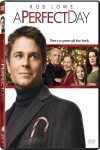
A PERFECT DAY
US, 2006, 100 minutes, Colour.
Rob Lowe, Frances Conroy, Paget Brewster, Meggie Geisland, Christopher Lloyd.
Directed by Peter Levin.
A Perfect Day is a Christmas allegory – somewhat in the vein of It’s a Wonderful Life.
The setting is Christmas with Rob Lowe’s author all alone in a hotel, challenged by a strange man, Michael. The film then goes into flashback, Rob’s life, being fired from his job, the support of his family, his decision to write a book, its success, his work with his agent, the fame going to his head, difficulties with his family. However, the mysterious stranger keeps appearing and telling him truths about himself, ultimately telling him that he is about to die. The film shows the effect of this news on the author and the challenge to reconcile with his family and with himself.
Rob Lowe is at home in the role of the author, genial, then the fame going to his head and facing the crisis. Paget Brewster is strong as his wife. Frances Conroy has a sympathetic role as the agent. Christopher Lloyd appears as the stranger – and it is something of a puzzle when there is a completely rational explanation to what seems to be his guardian angel appearances.
However, this is a film with sentiment, a moral fable about life, valuing what is important, seeing the temptations of a worldliness that can destroy all that is of value.
The film was written by Joyce Eliason, a veteran screenwriter for television, and directed by Peter Levin, a prolific director of television films from the 1970s.
1.The title, expectations? The book itself? Rob and his life? Carson and her comment on the perfect day?
2.The presentation of suburbia, homes and the town, hotels, the streets?
3.The contrast with New York, San Francisco, hotels, the world of publishing, promotion and book-signing?
4.The credibility of the plot, real, surreal? As an allegory about life?
5.The portrait of the family, the initial ideal, hard times, opportunities, change, the breaking of families, restoration?
6.Rob as husband and father, his hopes, the experience of being fired, business rather than friendship? His return home, the party and the sadness? The collage of his job-seeking? Digging ditches? The tension with his father? Relationship with his brother? Allyson and her love and support? His decision to write the book?
7.The effect of the book, Allyson being very moved? Reading her story? Sending letters to the agents, the experience of rejection? The phone call from Camille, her visit? The information about Michael, the mortician? Deals and contracts? The published book?
8.Camille as a friend, her support, her visits, her character? The deals, her advice? Rob and his decision to let her go – business rather than friendship? Her continued support, her friendship with Allyson?
9.The contrast with Heather, pushy, sexuality and power? Her relationship with the film agent? The promise of big deals? The temptation for Rob to leave Camille?
10.Rob and his being away, the initial book-signings, the increased numbers, on the bestseller list, the talk shows, television, discussions with Larry King – and his being pretentious? Allyson’s response? The phone calls? The effect – and the fame going to his head?
11.His being tested, Heather and his advances and his rejection? Meeting his former boss, his being asked to come to the Christmas party and his refusal? Meeting the aunt, her death, not able to go to the funeral? Talking with his wife, not answering her phone calls?
12.Michael, his appearances, mysterious, his being everywhere, like an angel? His warnings, his knowledge about Rob’s life? The way that he was photographed – and the suggestion of Archangel Michael? The talk, the discussion about death? The Christmas sermon, the revelation of the truth and Camille’s intervention? Her apology?
13.Rob, the fear of death, going to the doctor, trying to prepare everything for his family before he died?
14.Talking with his wife, daughter, Christmas Eve, his staying the night, his wife comforting him during the nightmare? His going back to the hotel?
15.The overall effect, the emotional impact of the film, its status as a fable about the meaning of life and values?